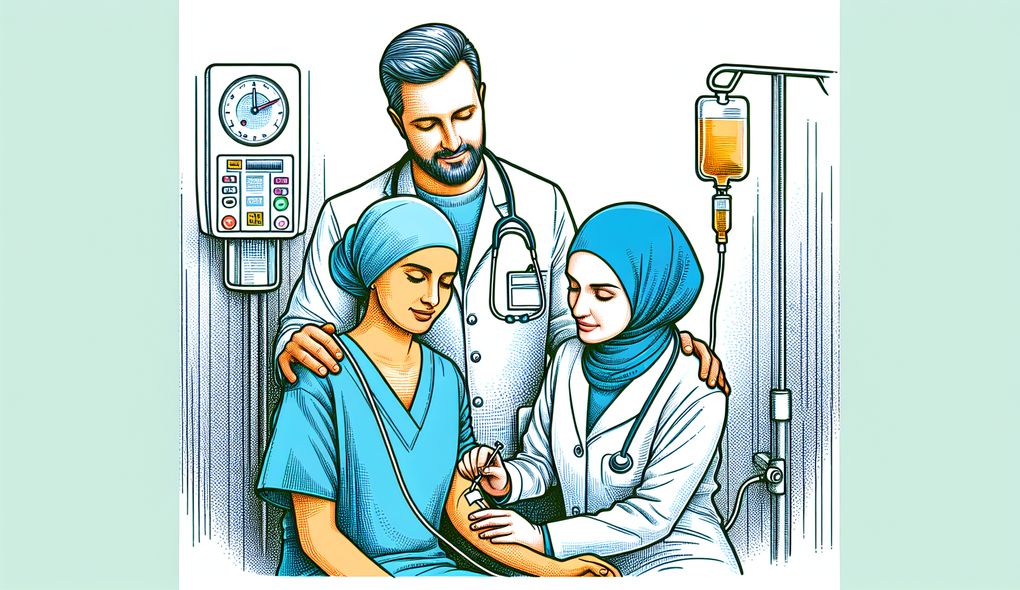How do you approach educating patients and their families about cancer treatments and side effects?
JUNIOR LEVEL

Sample answer to the question:
When educating patients and their families about cancer treatments and side effects, I approach it with empathy and compassion. I take the time to listen to their concerns and answer any questions they may have. I provide them with clear and understandable information about the treatments and potential side effects, making sure to use language that is easy to understand. I also offer resources and educational materials that they can reference later. Overall, my goal is to empower patients and their families to make informed decisions and feel supported throughout their cancer journey.
Here is a more solid answer:
When it comes to educating patients and their families about cancer treatments and side effects, I take a comprehensive approach. I start by assessing their current understanding of the disease and their treatment plan. Then, I tailor my explanations to their level of knowledge and use visual aids or diagrams if necessary to enhance their understanding. I make sure to provide information about the specific treatment options available to them, as well as the potential side effects and how they can be managed. I also address any concerns or misconceptions they may have and offer emotional support throughout the process. Additionally, I provide written materials and resources for them to refer to later. By taking this approach, I aim to empower patients and their families to actively participate in their treatment decisions and feel more confident in managing the effects of the disease and its treatments.
Why is this a more solid answer?
The solid answer provides more specific details about the candidate's approach to educating patients and their families about cancer treatments and side effects. It mentions assessing their current understanding, tailoring explanations, using visual aids, addressing concerns, and offering emotional support. However, it could further improve by including examples of past experiences in educating patients or strategies used to ensure effective communication.
An example of a exceptional answer:
In my experience as an Oncology Nurse, I have found that the key to educating patients and their families about cancer treatments and side effects is building a strong rapport with them. I take the time to establish trust and ensure they feel comfortable asking questions and expressing their concerns. I use a patient-centered approach by involving them in their care plan and decision-making process. This includes discussing treatment options in detail, explaining the potential side effects, and clearly outlining the management strategies we can implement. I utilize various educational resources, such as pamphlets, websites, and videos, to provide patients and their families with comprehensive information. In addition, I encourage open communication and collaborate with other healthcare professionals to address any complex questions or uncertainties. By continuously evaluating their understanding and adjusting my teaching approach, I can ensure that patients and their families are well-informed and empowered to make informed decisions about their care.
Why is this an exceptional answer?
The exceptional answer goes above and beyond by mentioning the importance of building rapport, involving the patient in their care, utilizing various educational resources, and collaborating with other healthcare professionals. It also emphasizes the candidate's continuous evaluation of patient understanding. The answer provides a clear explanation of the candidate's experience and strategies, showcasing their ability to educate patients and their families effectively.
How to prepare for this question:
- Familiarize yourself with different cancer treatments and their potential side effects. This will enable you to provide accurate and relevant information to patients and their families.
- Practice active listening skills to ensure you fully understand patient concerns and can address them effectively.
- Stay up-to-date with the latest research and developments in oncology nursing. This will allow you to provide the most current and evidence-based information to patients.
- Develop your communication skills, especially in explaining complex medical information in a clear and understandable manner.
- Consider role-playing scenarios to practice educating patients and their families about cancer treatments and side effects. This will help you refine your approach and identify areas for improvement.
What are interviewers evaluating with this question?
- Strong communication and interpersonal skills
- Compassionate and emotionally intelligent to support patients and families
- Knowledge of cancer treatment and side effects management

